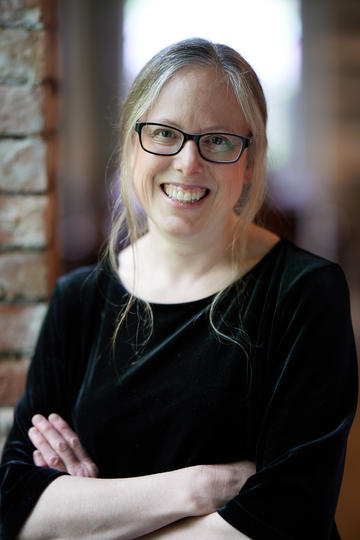Professor Kylie Vincent, co-founder of HydRegen

Kylie Vincent is Professor of Inorganic Chemistry at the University of Oxford and a cofounder and Non-Executive Director of the University of Oxford spinout company HydRegen. HydRegen had three employees by the end of 2021 and is set to grow during 2022. The company aims to develop cleaner ways of applying biocatalysis in the manufacture of chemicals, thereby cleaning up chemical production of . The company is at an R&D stage, with second round investment funding, and is engaging with end users by sending out demo samples of biocatalysts to potential industrial partners.
What is your background? What made you decide to get involved in supporting entrepreneurs?
I didn’t expect to become a founder or entrepreneur. My background is chemistry and I’ve also had an interest in the interface between chemistry and biological processes. I started my research group by studying the fundamental aspects of hydrogen in biology. I didn’t expect to take any research ideas to market but I benefited from earlier insights, gained through the entrepreneurship and intellectual property courses I’d attended during my post-doctoral research. When the research group accidentally encountered an area of work that was beneficial for biotechnology, we were well placed to work with OUI to protect the IP of the research findings and consider funding for research commercialisation.

My stance is informed by my academic background. For academics, entrepreneurship is about spotting how research findings can offer benefits to society and generate new avenues for industry.
How and when did you know your idea was good enough to develop it?
Quite early on in the process because we spotted the potential for the research before we got the science to work. We knew the science and research would have benefits for biotechnology. We didn’t know how it would be employed, or how industry could make use of the findings, but we recognised that there would be potential applications. This is the case for a lot of commercialised academic research – it can take a while to understand the benefits of the research and identify potential applications in society and industry. It took many conversations with industrial partners over 5+ years to realise how the research could respond to challenges in chemical manufacturing. I would advise academic researchers to have many conversations with colleagues in industry to identify the niche or gap that may be filled by the academic research. This process is different from traditional academic research since the information from scientific literature is not as relevant as targeted conversations with industry and people in the manufacturing sector.
What would you say are the top 3 skills that needed to be a successful entrepreneur? Why?
This question is probably quite difficult for entrepreneurs and founders with academic backgrounds. From my experience, I’d suggest: 1) be focused and target-orientated. Academics and researchers often want to pursue exciting research ideas but you need to be more focused as an entrepreneur which requires target-driven research; 2) be flexible – Academics and researchers should be flexible and be prepared to change directions as they identify market niches. 3) be people-focused. Academics should also be able to work with a range of people and be equipped to build a diverse team with the range of skills needed to tackle major challenges in creative ways.
What is your favourite part of being an entrepreneur?
I’d say seeing a research finding from the lab go forward towards application. It’s a wonderful feeling to see colleagues and professionals, who aren’t scientists themselves, be excited about science and recognise the broader implications of our research and its potential impact on sustainable manufacturing.
What has been your most satisfying or successful moment in business?
It’s early days for our business venture but I think the most satisfying moment so far would be seeing how potential end users of our technology are excited about the science behind our research alongside our research’s commercial value.
What would you say have been some of your mistakes, failures or lessons learned as an entrepreneur?
I think we have had many points where we could have spun-out of the university at an earlier stage but it’s difficult to assess the timings of these ventures. We took ‘slow way’ by beginning as a translation project within the university context. This was great because it allowed us to de-risk our technology before seeking investor funding. However, translation projects can have disadvantages since the research, in this university context, gets published because the graduate students and Post-Docs need publications as part of their work within the group. This means that know-how is shared, rather than kept as commercial secrets. These drawbacks aren’t necessarily mistakes. However, as a researcher, it highlights the importance of evaluating your options and making choices which have benefits for you and your venture.
How have you funded your ideas?
HydRegen didn’t spinout at the early stage which means we received funding from Innovate UK and other research councils. We were able to benefit from academic funding whilst focusing on commercial milestones. An important stepping stone was when our CEO and Co-Founder, Holly Reeve participated in the ICURe (Innovation to Commercialisation of University Research) programme which allowed her to speak to around one hundred companies and talk to key players in the value chain and work out a route to market. This was pivotal since it informed the company’s direction, and provided valuable insight to the commercialisation process, and also led to Follow-On Funding from Innovate UK.
Are there any sector-specific awards/grants/competitions that have helped you?
Back in 2013, we won an Emerging Technologies award from the Royal society of Chemistry. This was our first opportunity to come up with a name for the technology and host a pitch to potential investors. One of the judges became an informal mentor to us, and is now Chair of HydRegen’s board, and we also received valuable mentoring from industrial partners which helped us shape the technology and its commercial direction. This was a small award which made a significant difference to our spin-out journey and allowed us to shape HydRegen according to industrial needs.
What is good about being an entrepreneur in Oxfordshire?
There’s a fantastic eco-system of entrepreneurial support within the university and OUI. There’s also a range of spinouts who can offer advice and share insights from their experiences. This helped us avoid common pitfalls for spinouts. We’re also lucky that entrepreneurship is being recognised as a valid part of the academic career within the university. This increasing recognition will encourage other academics to look into research commercialisation and reward academic-led entrepreneurship.
If a new entrepreneur or startup came to you looking for entrepreneurship resources, where would you send them?
I would, of course, recommend IDEA and its associated programmes, including the Board Experience programme. Also the RisingWISE and SeedWISE programmes are an excellent place for gaining insight into entrepreneurship. These programmes can build confidence and assist in building a broad range of entrepreneurial skills that are valuable for many careers. OUI should be the first point-of-call for protecting IP and advising on routes to market for research innovations.
Have you faced any challenges as a woman entrepreneur? If so, how have you overcome them?
I would say training can be very valuable for overcoming a lack of confidence and imposter syndrome. The entrepreneurial courses that I undertook, through MEETS and the Said Business School, were very helpful for learning the language of entrepreneurship and generating confidence in sharing and following up on entrepreneurial ideas. At the same time, as the mother of two young children, I have had to balance life and career alongside entrepreneurial ambitions. Whilst I still lead a research group, teach in my Department and give tutorials in my college, I need to be flexible to ensure I can fulfil my entrepreneurial commitments. However, an academic career can be flexible enough to embed entrepreneurial activities within its wide-ranging remit.
What resources would you recommend for other women?
Alongside the courses on offer through IDEA, I would recommend that finding mentors who can chat through ideas and provide feedback is very important. It can be very useful as well as inspiring, to find other people going through similar stages of the entrepreneurial journey. This informal networking allows you learn together with your peers
How could institutions such as the University of Oxford better support women entrepreneurs?
We have to find ways to make space for entrepreneurship within the busy academic life. We have a lot going on as academics and entrepreneurship risks being seen as an add-on to an already busy job. Women, in particular, can be put off committing to entrepreneurship alongside their academic duties. We need to provide the space for entrepreneurship and reward and recognise it within academic departments.
Do you have any advice specifically for other women who want to be entrepreneurs?
Equip yourself with the skills to talk the language of entrepreneurship. Fight back the imposter syndrome and surround yourself with the right mentors – then have the confidence to give it a go!
Share this
More news



